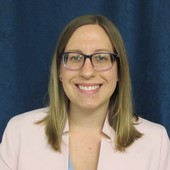April 19-15 is National Volunteer Week! Recently we spoke with Andrea Traskos of Catholic Charities Washtenaw County (CCWC). Andrea is the Program Director for the Retired and Senior Volunteer Program (RSVP), which provides enriching volunteering opportunities for older adults. In this interview Andrea discusses what the RSVP program does, who she works closely with, and shares current volunteer needs.
Ahead of the Curve: If you had to give an elevator speech about what your program does, how would you describe it?
Andrea Traskos: The Retired and Senior Volunteer Program, RSVP for short, is a senior services program of Catholic Charities Washtenaw County (CCWC). Adults age 55 years and older, based on their skills, experience, interests, and flexibility, are matched to volunteer needs not just within CCWC, nonprofit organizations throughout Washtenaw County. RSVP is a national service program that is regulated and funded by the Corporation for Community and National Service (CNCS). For those who know the program AmeriCorps, RSVP is under that same umbrella, CNCS. RSVP has been active in the county for over 47 years!
AOTC: Walk me through step by step process. What happens when you get a phone call/referral?
AT: When we receive an inquiry for one of our volunteer postings over the phone or email, we go through our initial screening process. The first step is reaching out to the potential volunteer to thank them for their interest. During the call or email we do ask if the individual is of least 55 years old or older (we ask because our program is federally regulated). From there, we conduct a screening over the phone to gather some basic information and then invite the potential volunteer to our office for what we like to call a volunteer match meeting. During this volunteer match meeting, the RSVP Volunteer Coordinator or Program Director, goes through a series of questions to bring up skills, experience, interests, and the amount of time that volunteer realistically has available to offer support service.
In the meeting, we match the volunteer to at least three volunteer opportunities. The volunteer then decides which opportunity to start with first. We like to recommend starting off with one volunteer opportunity first and then if the volunteer finds out they have more time to serve, we then add a second one and so forth. We fill out the online volunteer application at the site the volunteer wishes to serve at. We then call and email the site coordinator connecting them to our RSVP volunteer to schedule a day and time to meet in person. The RSVP Volunteer then goes through RSVP orientation and orientation and training at the site as well. By going through this process, the RSVP volunteer is vetted as the RSVP program staff conducted all the initial screening and interview questions. Once the RSVP Volunteer begins serving at the organization RSVP staff keeps in constant communication with the site coordinator and the RSVP Volunteer to ensure it’s a smooth transition and a perfect match for a meaningful volunteer opportunity.
AOTC: What organizations do you work closely with?
AT: Our RSVP program works very closely with Catholic Charities Washtenaw County (CCWC). In addition to partnering with programs within Catholic Charities Washtenaw County, the RSVP program partners and collaborates with over 50 nonprofit and governmental organizations throughout Washtenaw County. RSVP partners with hospitals, food banks, Meals on Wheels, Medicaid non-medical transportation, senior centers, environmental organizations, social services organizations, Opioid prevention organizations, homeless shelters, and thrift shops.
Since the RSVP program is federally and state funded, the program works closely with the Corporation for National and Community Service (CNCS) and the Michigan Department of Health and Human Services Aging and Adult Services Agency (AASA) to ensure program compliance and goals of the program are being met.
AOTC: What are some things you wish the public knew about your role?
AT: My role is to ensure that the RSVP program is running smoothly and is following all the necessary federal regulations. I work closely with several of our community partners, especially when a high need for volunteer support comes up. We work together to solve that solution with a volunteer support role. To continue to support our RSVP volunteers serving in many different capacities, the RSVP program offers an educational workshop once a quarter as part of the program’s Serve and Learn Series. For these workshops, the RSVP is always looking for more presenters from the county on various topics such as nutrition, dementia, etc. Each year, the RSVP program plans an Annual Volunteer Recognition Luncheon for all RSVP Volunteers and community partners are invited. We honor volunteers each year and throughout the year at various collaboration events.
What some may not know is that I am the current Vice-President of the Michigan Association of the Retired & Senior Volunteer Program and a member on the Steering Committee for Older Michiganians Day, a day seniors advocate at Michigan’s Capitol. As a Program Director, I try to keep our RSVP tied to the needs of Washtenaw County. I am always seeking new ways to collaborate and partner with organizations as community needs arise.
AOTC: What tips do you have for someone with a loved one that’s going through this issue/needs assistance?
AT: For volunteers who live within Washtenaw County, RSVP staff refers to Catholic Charities Washtenaw County Senior Services Resource Advocates to help. If the volunteer is tech savvy, I refer the volunteer to the Ahead of the Curve Website for a complete list of resources. What is really cool about this RSVP program is that our volunteers come from diverse backgrounds and majority of the time the volunteer serving at a site can take advantage of services at the organization as well to help their selves, a family member, friend or neighbor. By having a referral process and close partnerships to nonprofit organizations, the RSVP program becomes full circle, as helping organizations, their clients and RSVP volunteers in the process.
AOTC: Is there anything you would like to add?
AT: Although the RSVP program is housed within Catholic Charities Washtenaw County, you do not need to be Catholic to serve or be a part of this program. RSVP welcomes anyone, regardless of their beliefs, as long as they have the heart to serve and help others within our communities. RSVP volunteers are not like AmeriCorps members where they are paid a stipend or paid mileage reimbursement for their services. The majority of RSVP’s partnered organizations do run backgrounds prior to volunteer service. RSVP conducts background checks internally, if the RSVP volunteer decides to serve at a CCWC program.
RSVP works closely with the staff United Way of Washtenaw County, University of Michigan Ginsberg Center and Eastern Michigan University on volunteer and event opportunities listed on a Volunteer Portal called Volunteer Washtenaw.
RSVP is in need of many eligible volunteers who have time to donate to further help these nonprofit organizations provide services to clients in the community. Currently within CCWC, RSVP is seeking volunteers for the Home Safety Services, Grandparents as Parents Program, Northside Food Pantry, Nurturing Families program, Volunteer Caregiver Respite, and the Washtenaw Child Advocacy Center.
To begin your volunteer experience, please fill out the volunteer interest form on the CCWC website.
If you’re not as tech savvy, the RSVP office is open weekdays between the hours of 8:30am and 4:30pm. Potential Volunteers and potential community partners, may call the RSVP office at 734-971-9781 or email [email protected]
Thank you to Andrea Traskos for giving us a look into this unique volunteer program.
If you want to learn more about RSVP program, you can visit their website.






